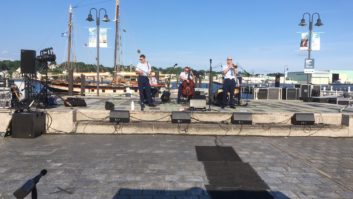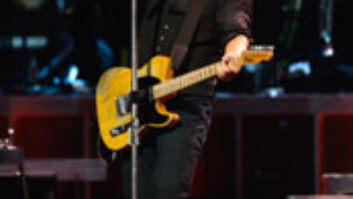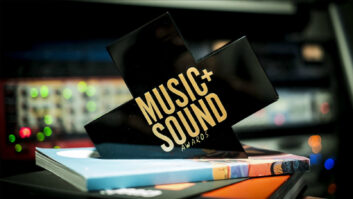 Steven Van Zandt
Steven Van ZandtSteven Van Zandt is well known to many, but for different reasons, since he is often consumed with such a diversity of projects—oftentimes in different disciplines. He is known to many as Silvio Dante on the television series The Sopranos, and to others as Miami Steve, the lead guitarist of Bruce Springsteen’s E Street Band. Most recently, he is known to fans around the world as a solo artist and leader of Little Steven and The Disciples of Soul. His most recent album, Summer of Sorcery, takes the artist on a fictional journey that explores the essence of summer and its associated spirit of nostalgia, romance and discovery. Pro Sound News spoke to Little Steven in the midst of what he describes as a challenging and emotionally rewarding project.
On creating cohesion
This is the first time I’ve ever done two albums in a row with the same band, and that has been really important because I am trying to be more consistent now. My solo albums in the ’80s were all very different musically because they were just the sounds of whatever theme I was talking about in the lyrics, but now I am making it a priority to stay musically consistent. I am going to keep this big band sound that I have now with the five horns, the strings and the background vocals and stay consistent with it. This album has been a major artistic breakthrough for me—I came in wanting to change the fact that all my records were autobiographical and political, and I achieved that. This album is all fictional—kind of like the movies—and I get a chance to play a different character in each song. It’s like combining my acting and music into one thing.
On working in analog
I still record on tape. We have an analog mixing console, and I have various analog outboard gear that we’ve been using for 30 or 40 years, maybe longer. To my ear, the music sounds different when it’s recorded to tape, and I still like that. When you walk into my studio, it looks like a studio from 50 years ago. As far as guitar is concerned, I am still playing most of the solos on this record, but I keep it pretty simple, to tell you the truth. I have my Stratocaster, along with a Vox AC30 and a couple pedals. I’ll use a little delay, a little Leslie and maybe a fuzz tone and that’s it. For acoustic, I’ll put up my old Martin D-28, which I’ve used on probably every record I’ve ever made. Once in a while I might play a Les Paul on a blues song, but other than that, it’s a straight Stratocaster going into an AC30 with a couple pedals.

On recording the title track
The title track, “Summer of Sorcery,” was very important to me. It really was quite an emotional song and uncharted territory for me to wander into. Song arrangements are usually very obvious to me—I usually work very fast and this band is very fast—but this song was a little unusual, so I had to spend more time shaping it. I tried dropping things out, putting things in, and tried to figure out the vibe. It had more of a droning, cumulative feel than an obvious “A section, B section, bridge.” There were no chord changes; it is just the 1, 4, 5 throughout the entire song, so all the dynamics have to come from the arrangement itself rather than depending on the natural chord changes. This tune took the most work, but was also the most satisfying in the end because it really turned out well.
On the “intangible element”
There is an intangible element that goes with writing. We are always trying to turn art into science, but we never quite succeed because there is that little bit of mystery that keeps you from ever feeling secure. Can I write another song as good as the last one I wrote? Can a Bruce album be as good as the last one? I have very high standards and I am always very concerned because I’ve never done anything in my life that wasn’t as good or better than the last thing I did, ever. So I hold that standard very high and I take it very seriously, and there is always that concern. This time, I wasn’t sure if I could pull it off because I had never done a fictional album. It was really a mystery to me until the last minute—but then you get in there and you see the songs start to come alive with the band. Then you start getting the feedback from the band, which is really your first feedback. How the band responds to the songs really counts. They were really loving it from the first moment and were very encouraging.
Related: Music Etc.: Micky Dolenz, by Jacques Sonyieux, April 21, 2019
On respecting roots
There’s a tradition that we’re part of. If you play in the broad genre of traditional rock ’n’ roll—and that is quite a wide area going back to the blues roots, the gospel roots and the Irish folksong roots—you combine all of this and get into the ’50s and ’60s, which is an absolute renaissance period, and I don’t say that casually. When the greatest art being made is also the most commercial, you’ve got yourself a real renaissance. We grew up in the middle of a renaissance and we grew up learning our craft just two generations away from the source. We were so close to the source that we’ve kept these roots in our work—and that is what I think gives the music its longevity. People feel the very strong emotions that come from our music because we are coming from very strong emotional roots.
Want more stories like this? Subscribe to our newsletter and get it delivered right to your inbox.






